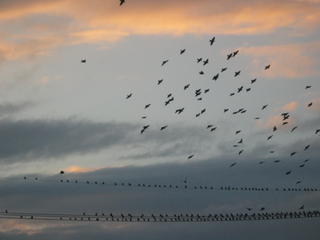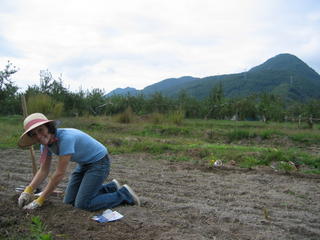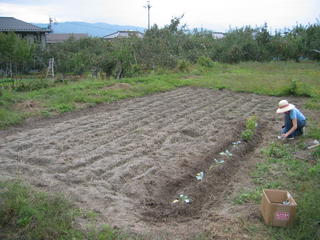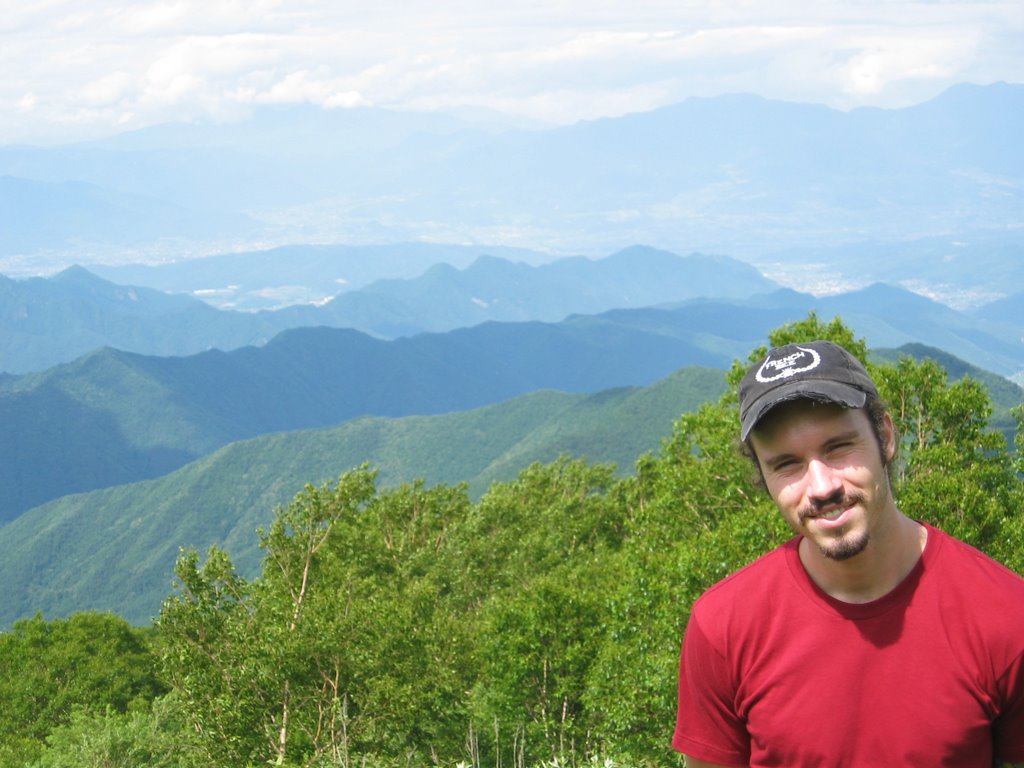 When Gregg told me he was turning 50 this year, I was shocked. The tanned, white skin on his face is pulled tight around his cheeks and jaw like it was shrink wrapped onto his head, his hair-carpeted scalp would keep a fox or mink quite warm if it was ever sown into a coat of human pelts, and he carried himself with an air of humility amidst a throng of people in their twenties. Overhearing him talk about snowboarding, I introduced myself and absorbed all of Gregg’s advice on where to ride, where not to ride, and where to hike up into the mountains to ride backcountry-hiking trails in the winter. He explained that he’s been living in Ueda for 10 years off and on (he tries to travel for at least six months out of every year--last year he split his time between Egypt, France, and the Philippines), and he’s currently trying to decide whether or not he should move to the Hakuba area (a region saturated with ski resorts two hours north) to manage a hotel in desperate need of a good manager. He told me stories about snowboarding down the side of Mt. Fuji. He and his friends used to start hiking at 4:00 a.m., stop hiking at noon, and enjoy a two-hour, tourist-less ride down the desolate back slopes of Fuji. He invited me to come this year with them, but he warned me and said that a good friend of his died while trying to play in Fuji’s snow-covered backcountry terrain.
When Gregg told me he was turning 50 this year, I was shocked. The tanned, white skin on his face is pulled tight around his cheeks and jaw like it was shrink wrapped onto his head, his hair-carpeted scalp would keep a fox or mink quite warm if it was ever sown into a coat of human pelts, and he carried himself with an air of humility amidst a throng of people in their twenties. Overhearing him talk about snowboarding, I introduced myself and absorbed all of Gregg’s advice on where to ride, where not to ride, and where to hike up into the mountains to ride backcountry-hiking trails in the winter. He explained that he’s been living in Ueda for 10 years off and on (he tries to travel for at least six months out of every year--last year he split his time between Egypt, France, and the Philippines), and he’s currently trying to decide whether or not he should move to the Hakuba area (a region saturated with ski resorts two hours north) to manage a hotel in desperate need of a good manager. He told me stories about snowboarding down the side of Mt. Fuji. He and his friends used to start hiking at 4:00 a.m., stop hiking at noon, and enjoy a two-hour, tourist-less ride down the desolate back slopes of Fuji. He invited me to come this year with them, but he warned me and said that a good friend of his died while trying to play in Fuji’s snow-covered backcountry terrain.We ended up talking about farming, and Gregg mentioned that he helped Mike (another J.E.T.) get a huge plot of farmland on the outskirts of Ueda. He said that his landlords, the people who met him 10 years ago and, after some tea and conversation, decided to let him live rent free in an empty house they owned in town, knew a man who had so much land he didn’t know what to do with it all. Gregg said the landowner loves trying to practice his English with foreigners and encourages Gregg to give pieces of the land away to foreigners. At first I couldn’t believe what Gregg was describing. With each sentence he rattled off between smiles it seemed like he was talking his way deeper and deeper into a bullshit-filled hole. Why would anyone in his right mind give away fertile land in a valley? Apples sell for $1.50 each in Japan; land is priceless here! I thought. After a few minutes, however, I remembered that we were living in Japan, a country in which people give stuff away on a daily basis, and I got excited thinking about the prospects of growing massive amounts of eggplant, tomatoes, corn, and cucumber to eat and give away to friends and co-workers (one or two English teachers bring in candy, vegetables, or fruit each week for the teachers in the English department to enjoy—if you grow vegetables, you give part of your crop away). I asked Gregg if he could save a small plot for Colleen and I. He agreed and offered to drive us up to see the land the following Saturday.
 The field is breathtaking. Even on a cloudy day, the scenery and the smell and the sound of the crickets and the breeze could green the thumbs of even the most hardened urban resident. Apple orchards colored with thousands of bright red, grapefruit-sized apples ready for the picking surround the farmland. Towering behind the orchards, adding a jagged heartbeat to the straight horizon that flatlines in the absence of hilly excitement, are furry green mountains, geological blemishes on the skin of the earth that protect the fields from strong winds as typhoons pass and guarantee afternoon rain showers in the summertime, the kinds that are just long enough to inspire plants to sprout a few extra buds and just short enough to go unnoticed when you stop into a store for an ice cream.
The field is breathtaking. Even on a cloudy day, the scenery and the smell and the sound of the crickets and the breeze could green the thumbs of even the most hardened urban resident. Apple orchards colored with thousands of bright red, grapefruit-sized apples ready for the picking surround the farmland. Towering behind the orchards, adding a jagged heartbeat to the straight horizon that flatlines in the absence of hilly excitement, are furry green mountains, geological blemishes on the skin of the earth that protect the fields from strong winds as typhoons pass and guarantee afternoon rain showers in the summertime, the kinds that are just long enough to inspire plants to sprout a few extra buds and just short enough to go unnoticed when you stop into a store for an ice cream. There is a shed fashioned out of blue tarps on the property that houses communal tools and a gas powered tilling machine. The landowner built a gazebo from plastic mesh and poles last year so farmers could eat lunch in the shade at a small picnic table. A rain drainage ditch feeds water into two huge tubs, and a pump and generator help push the water out onto the plots. There are about eight or nine plots in the field. When Gregg showed us our plot, it was tilled and waiting to be planted.
There is a shed fashioned out of blue tarps on the property that houses communal tools and a gas powered tilling machine. The landowner built a gazebo from plastic mesh and poles last year so farmers could eat lunch in the shade at a small picnic table. A rain drainage ditch feeds water into two huge tubs, and a pump and generator help push the water out onto the plots. There are about eight or nine plots in the field. When Gregg showed us our plot, it was tilled and waiting to be planted.A few days ago we went up to the field to plant tulip bulbs and some pepper plants, and we met the landowner and two other farmers. We interrupted their lunch at the picnic table to introduce ourselves, and the landowner, a stout man in his fifties who is all smiles and bows in the presence of foreigners, showed us to our plot, offered to retill the land even though it was clearly just tilled a few weeks ago, filled up the nearest water tub for us, and, later, had his daughter bring us two loaves of melon bread and two juice boxes of milk after we had worked up a sweat from planting.
We’re going to try to keep a winter garden going with garlic, spinach, and broccoli, but I’m most excited about the crops we’ll be able to start with the arrival of spring.
More to come as life unfolds,
Andrew


No comments:
Post a Comment